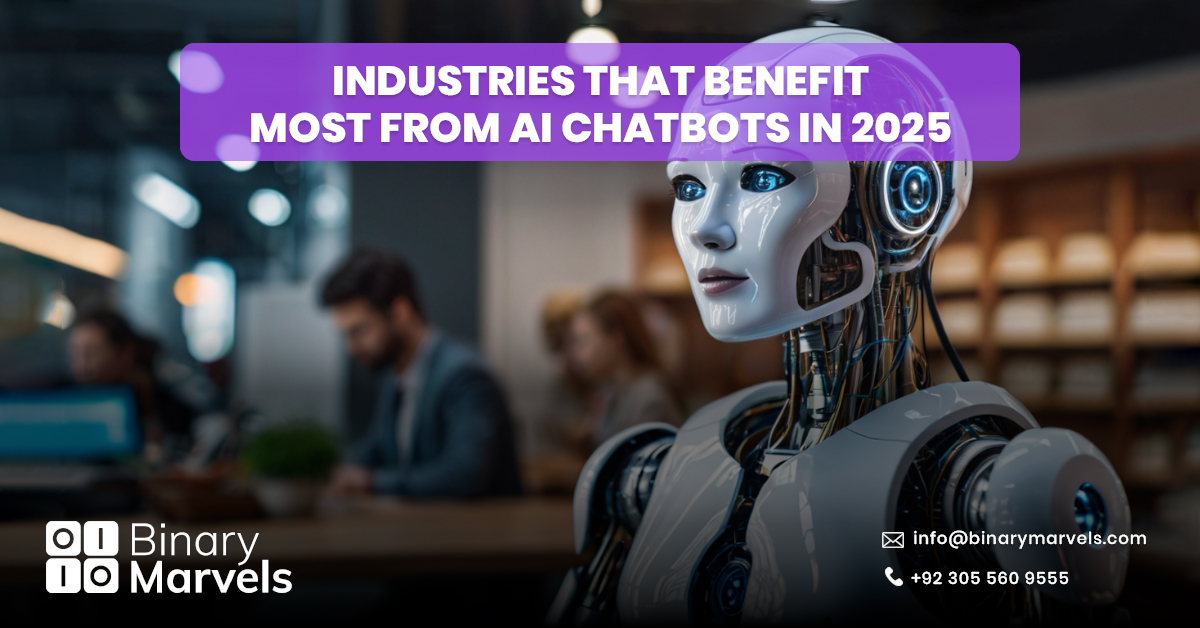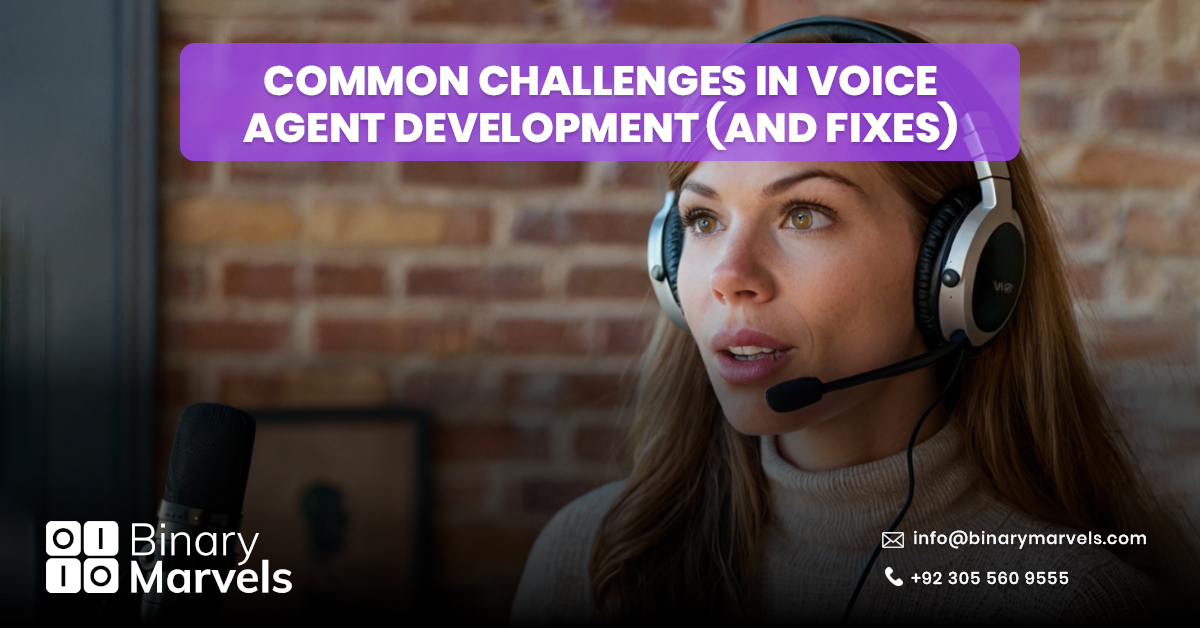
Are AI chatbots really transforming businesses in 2025, or is it just hype?
The answer lies in how rapidly different industries are adopting AI-powered solutions to streamline communication, automate customer service, and boost sales. With advancements in natural language processing and integration capabilities, AI chatbots are no longer just simple support tools. They’re becoming intelligent virtual assistants that can handle everything from lead generation to personalized customer experiences.
In this article, we’ll explore the industries that benefit the most from AI chatbots in 2025 and how businesses across various sectors are leveraging them to improve efficiency, reduce costs, and stay competitive in a fast-evolving digital landscape.
Let’s dive into the top-performing sectors and what makes AI chatbots a game-changer for them.
Also Read: Top 10 AI Companies in Pakistan
Top Industries That Benefit Most from AI Chatbots in 2025
AI chatbots are transforming how industries interact with customers, manage operations, and drive revenue. In 2025, some sectors are experiencing faster adoption and greater returns than others. Here’s a breakdown of the top industries leveraging AI chatbots most effectively.
1. E-commerce and Retail
AI chatbots are helping online stores boost sales, reduce cart abandonment, and enhance post-purchase support. From personalized product recommendations to instant order tracking, chatbots offer seamless shopping experiences that improve customer satisfaction and conversion rates.
Key Benefits:
- 24/7 customer assistance
- Automated returns and refunds
- Personalized product suggestions
Popular Use Cases:
Abandoned cart recovery, upselling, and customer feedback collection
2. Healthcare
In healthcare, AI chatbots are improving patient engagement and streamlining administrative tasks. They assist with appointment booking, symptom checking, and providing instant answers to common medical queries while maintaining data privacy and compliance standards.
Key Benefits:
- Reduced wait times for patients
- Efficient triage and scheduling
- Secure communication channels
Popular Use Cases:
Virtual health assistants, medication reminders, and insurance FAQs
3. Banking and Finance
Banks and financial institutions are using AI chatbots to deliver quick, secure, and personalized services. Whether it’s checking balances, tracking transactions, or applying for loans, chatbots improve efficiency while maintaining strong data security.
Key Benefits:
- Real-time support for transactions
- Fraud detection alerts
- Personalized financial advice
Popular Use Cases:
Loan prequalification, account inquiries, and investment recommendations
4. Education and eLearning
Educational institutions and online learning platforms use chatbots as virtual tutors, helping students with course selection, lesson reminders, and instant answers to academic questions.
Key Benefits:
- Personalized learning journeys
- Round-the-clock student support
- Simplified admissions and onboarding
Popular Use Cases:
Quiz bots, assignment helpers, and course advisors
Also Read: How AI Chatbots Reduce Support Costs and Improve Response Times?
5. Travel and Hospitality
AI chatbots in travel and hospitality handle everything from booking assistance to real-time itinerary updates. They support travelers in multiple languages and help businesses deliver exceptional guest experiences.
Key Benefits:
- Faster booking and cancellations
- Location-based suggestions
- Multilingual customer service
Popular Use Cases:
Hotel reservations, flight updates, and local attraction guidance
6. Real Estate
Real estate agents and property portals use AI chatbots to qualify leads, recommend properties, and schedule viewings. This saves time and ensures only high-intent prospects reach the sales team.
Key Benefits:
- Automated lead qualification
- Instant property matching
- Appointment scheduling
Popular Use Cases:
Virtual tours, location-based listings, and rental assistance
7. Telecom and Utilities
These industries rely on chatbots to handle high volumes of customer inquiries. From billing issues to service disruptions, AI chatbots ensure faster resolution and reduced call center pressure.
Key Benefits:
- Lower support costs
- Instant issue resolution
- Service plan upgrades and renewals
Popular Use Cases:
Troubleshooting guides, outage updates, and plan comparisons
8. Customer Support Across All Industries
Regardless of sector, businesses are using AI chatbots to manage high support volumes, reduce ticket backlog, and improve satisfaction scores. With smart handover features, chatbots can pass complex cases to human agents without losing context.
Key Benefits:
- 24/7 availability
- Multichannel integration
- Real-time analytics and feedback
Popular Use Cases:
Live chat automation, escalation handling, and feedback collection
Key Features Making AI Chatbots Industry-Friendly
What makes AI chatbots so adaptable across different industries in 2025? The answer lies in their powerful features and flexibility to integrate with business workflows. Modern AI chatbots are designed to be more than just conversation tools. They act as intelligent assistants that can understand, learn, and deliver value in real-time.
1. Seamless Integrations
AI chatbots connect easily with CRMs, helpdesk platforms, eCommerce systems, calendars, and third-party APIs. This allows them to fetch or update information, automate tasks, and offer personalized responses based on user data.
2. Advanced Natural Language Processing
With the latest NLP models, chatbots understand human language with greater accuracy. They can recognize intent, respond conversationally, and handle follow-up questions without losing context.
3. Multilingual and Localized Support
Global businesses rely on chatbots to communicate in multiple languages, catering to diverse customer bases without needing separate human agents for each region.
4. Omnichannel Availability
Chatbots work across websites, mobile apps, WhatsApp, Messenger, Instagram, and more. This ensures customers receive consistent service wherever they engage with your brand.
5. Custom Workflows and Smart Routing
Chatbots can trigger workflows like appointment bookings, form submissions, or product recommendations. They can also route complex queries to the right human agent using custom rules.
6. Analytics and Real-Time Insights
Modern AI chatbots provide actionable insights into customer behavior, common queries, and performance metrics, helping businesses continuously improve their service strategies.
7. Security and Compliance
With encryption, role-based access, and compliance with GDPR, HIPAA, and other regulations, chatbots ensure that sensitive data is handled securely.
Also Read: Top 10 Use Cases for AI Chatbots in 2025
Case Studies or Success Examples
To understand the real impact of AI chatbots, let’s look at how businesses across different industries are seeing measurable success in 2025.
E-commerce Brand Boosts Conversions by 30 Percent
A fashion retailer integrated an AI chatbot on its website and WhatsApp channel. The bot handled product questions, tracked orders, and recommended items based on browsing history. As a result, customer engagement increased and conversions grew by 30 percent within three months.
Healthcare Clinic Reduces No-Shows by 45 Percent
A mid-sized clinic used an AI chatbot to confirm appointments, send reminders, and reschedule missed visits. Patients could easily interact with the bot through SMS or web chat. This automation led to a 45 percent drop in appointment no-shows.
Banking App Handles 70 Percent of Customer Queries
A leading fintech company deployed a multilingual chatbot within its mobile app. It answered questions about accounts, transactions, and loan applications. Over 70 percent of queries were resolved without human intervention, saving support costs and improving response times.
University Increases Student Enrollment Inquiries by 60 Percent
An online university launched a chatbot to guide potential students through course selection, admissions, and FAQs. The bot responded instantly 24/7, leading to a 60 percent increase in inquiry-to-application conversion rate.
Hotel Group Enhances Guest Experience Across 5 Countries
A hospitality group integrated an AI chatbot across its hotel websites. Guests used it to request services, get travel tips, and make bookings. The chatbot supported five languages and helped increase direct bookings while reducing dependency on third-party platforms.
Choosing the Right Chatbot for Your Industry
Not all AI chatbots are built the same. To get the best results, it’s important to choose a solution that fits your business goals, industry needs, and technical infrastructure. Here are key factors to consider when selecting the right chatbot in 2025.
1. Industry-Specific Use Cases
Choose a chatbot that understands your sector. For example, a healthcare chatbot should be HIPAA-compliant, while a real estate bot should support lead qualification and scheduling.
2. Customization and Flexibility
The best chatbot platforms allow you to design custom flows, branding, and responses. This ensures the bot reflects your business voice and addresses unique customer journeys.
Also Read: The Ethics of Data Privacy and Security in AI Chatbots
3. Integration Capabilities
Your chatbot should connect easily with your existing tools like CRMs, payment systems, calendars, or ticketing platforms. This integration streamlines operations and improves data accuracy.
4. Multilingual and Multichannel Support
If your audience is global or diverse, choose a chatbot that speaks multiple languages and works across platforms like websites, mobile apps, and social channels.
5. Scalability and Performance
As your business grows, your chatbot should be able to handle increasing conversations without lag. Check how well the platform supports scaling and traffic spikes.
6. Security and Compliance
Look for end-to-end encryption, data privacy features, and compliance with relevant regulations such as GDPR, HIPAA, or CCPA. This is especially important for finance, healthcare, and government-related use cases.
7. Analytics and Reporting
Insightful dashboards help you track bot performance, user behavior, and ROI. Make sure your chatbot provides real-time data that supports decision-making.
8. Human Handoff Capability
Your bot should know when to escalate complex queries to a live agent. Smooth transitions without repeating information enhance user experience and reduce frustration.
Supercharge Your Business with AI Today!
As a trusted AI Development Company in Pakistan, we deliver cutting-edge AI Development Services designed to streamline your operations and enhance customer engagement.
Don’t wait—connect with us now and take your business to the next level!
Conclusion
AI chatbots are no longer just an emerging trend in 2025. They are a proven solution that helps businesses across multiple industries improve efficiency, reduce operational costs, and deliver better customer experiences. From e-commerce and healthcare to education and banking, AI chatbots are transforming how companies connect with their audiences and manage daily operations.
Choosing the right chatbot tailored to your industry can make a significant impact on your growth and customer satisfaction. With ongoing advancements in voice technology, personalization, and intelligent automation, the potential of AI chatbots will only continue to expand.
Now is the time to explore how an AI chatbot can fit into your business strategy and stay ahead in a competitive digital world.
FAQs
1. What are AI chatbots used for in different industries?
AI chatbots are used for customer support, lead generation, appointment booking, product recommendations, order tracking, and answering frequently asked questions. They help automate repetitive tasks and enhance user engagement across various sectors.
2. Are AI chatbots suitable for small businesses?
Yes, many AI chatbot platforms offer affordable plans that are ideal for small businesses. They help reduce customer service costs and improve response time, even with limited staff.
3. How secure are AI chatbots in 2025?
Modern AI chatbots follow strict security protocols, including data encryption and user authentication. They are built to comply with industry-specific regulations such as GDPR, HIPAA, and CCPA.
4. Can AI chatbots handle multiple languages?
Yes, most advanced chatbots in 2025 support multilingual conversations. This makes them highly effective for global businesses that serve diverse audiences.
5. Will AI chatbots replace human employees?
AI chatbots are designed to assist, not replace, human employees. They handle routine and repetitive queries while allowing human agents to focus on complex or sensitive issues.
6. How do I choose the right chatbot for my business?
Consider your industry needs, required integrations, level of customization, security requirements, and budget. Look for a chatbot platform that offers analytics, live chat handover, and future scalability.
7. What platforms can I use AI chatbots on?
AI chatbots can be deployed on websites, mobile apps, Facebook Messenger, WhatsApp, Instagram, Telegram, and other messaging platforms, depending on your audience’s preferences.









